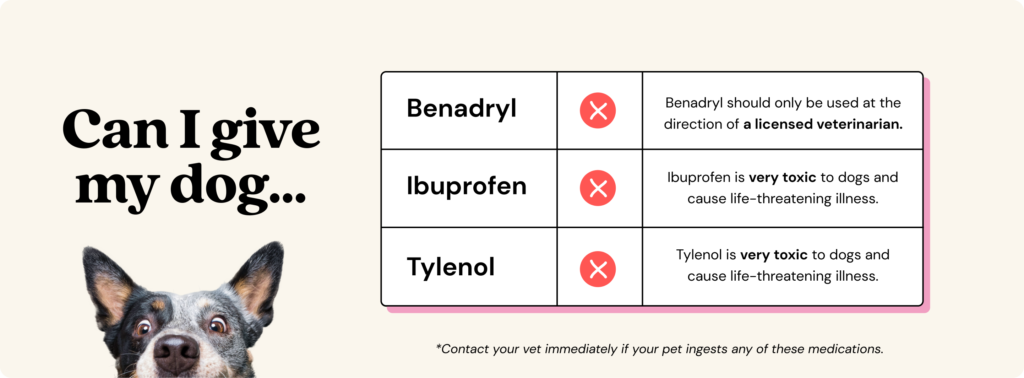
can i give my dog tylenol Overview of Acetaminophen for Canines
Pet owners often wonder if their dogs can safely take Tylenol. Acetaminophen, the active ingredient in Tylenol®, is a common over-the-counter medication used to relieve pain. Although it can be used in dogs, there are newer, safer alternatives available.
Due to the risk of toxicity, some veterinarians advise against using acetaminophen for dogs, while others may prescribe it cautiously.
Here are some key points about acetaminophen:
– Acetaminophen falls under the category of non-opiate analgesics. It alleviates pain but is not related to morphine.
– Unlike traditional non-steroidal anti-inflammatory drugs (NSAIDs) used for dogs, acetaminophen does not reduce inflammation. NSAIDs, such as Rimadyl® (carprofen), Metacam® (meloxicam), and Deramaxx® (deracoxib), are more commonly prescribed for pain and inflammation in dogs.
– Although acetaminophen is available over-the-counter, it should only be used under the guidance of a veterinarian.
– The FDA has not approved acetaminophen for use in animals, but veterinarians can legally prescribe it as an extra-label drug.

Brand Names and Other Names of Acetaminophen
Acetaminophen is approved solely for use in humans. The most recognizable brand is Tylenol®, but there are many other brands such as Acephen, Altenol, and FeverAll. It’s available under various trade names and generic versions from multiple drug companies. In the UK, acetaminophen is known as paracetamol.
There are also many combination products designed to treat both cold symptoms and pain. However, these should never be used for pets without veterinary approval. Currently, there are no acetaminophen formulations specifically approved for veterinary use.


Uses of Acetaminophen for Dogs
Tylenol is primarily used to manage pain in dogs, but there are safer and more effective options available for both fever and pain relief. As a result, acetaminophen is not commonly used in canines. For severe pain, particularly after surgery, medications like codeine, tramadol, or hydrocodone may be prescribed. To understand more about managing pain in dogs, explore the available treatments and options.

Precautions and Side Effects
Acetaminophen can be safe and effective for dogs when prescribed by a veterinarian, but caution is crucial. Overdosing on acetaminophen can lead to toxicity, and it should not be used in dogs with known allergies or sensitivities to the drug.
Acetaminophen can also interact with various medications, so it’s important to consult your vet if your pet is taking other drugs. Potential interactions include doxorubicin, barbiturates, fenbendazole, isoniazid, phenothiazines, propylene glycol, warfarin, and certain anesthetics.
Because acetaminophen is not commonly used in animals, there is limited information on its side effects. However, it can cause damage to the kidneys, liver, and gastrointestinal tract. Always seek veterinary advice before administering this medication

How Acetaminophen Is Supplied
Acetaminophen comes in various forms, including tablets, capsules, and liquid concentrations, with the liquid form being the most commonly used for dogs. It is also available as suppositories, elixirs, and extended-release tablets. The most common dosages are 325 mg and 500 mg tablets, with the latter often labeled as extra strength.
Dosing Information of Acetaminophen for Dogs
Never administer medication to your dog without first consulting your veterinarian. There are often better alternatives for managing fever and pain, making acetaminophen a less common choice for dogs. If medication costs are a concern, pet insurance might be a viable option to explore.
For dogs, a typical dosage is 5 to 7.5 mg per pound (10 to 15 mg/kg), given two to three times a day. If the medication is needed for more than five days, it’s generally recommended to administer it twice daily. The length of treatment depends on the condition being treated, how your dog responds, and any side effects that may develop. Always follow your vet’s instructions and complete the full course of treatment, even if your dog seems to improve, to ensure a full recovery and prevent relapse.
Tylenol Toxicity
Toxicity can occur if owners administer medication without veterinary approval or if medication is accidentally ingested from the floor. Even just two tablets can be toxic to a 50-pound dog. The primary concerns are liver damage and destruction of red blood cells, leading to symptoms such as difficulty breathing, weakness, lethargy, vomiting, diarrhea, facial swelling, unusual behaviors, trouble walking, jaundice, and even death. High doses of acetaminophen can also cause dry eye (keratoconjunctivitis sicca).
If you suspect your dog has ingested too much acetaminophen, contact your veterinarian, an emergency veterinary clinic, or a pet poison hotline immediately. Treatment typically includes inducing vomiting if the ingestion was recent, administering activated charcoal to limit absorption, and providing supportive care like oxygen, blood transfusions, acetylcysteine for liver protection, intravenous fluids, and S-adenosyl-methionine (SAMe).
To keep your dog safe, check out our article: “Protect Your Dog from 5 Lethal Household Items.”

FAQs About Tylenol Use for Dogs
Here are some frequently asked questions about using Tylenol for treating pain in dogs:
**Can you give a dog Tylenol for pain?**
Acetaminophen, found in Tylenol, is a non-opiate analgesic that can reduce pain. While it can be effective, there are safer and more suitable pain medications specifically approved for dogs. Always consult your veterinarian to find the best treatment for your dog’s condition. For more information, check out our article on medications you should never give your dog.
**How much Tylenol can I give my dog?**
A typical dose for dogs is 5 to 7 mg per pound of body weight, given twice daily. However, this should only be administered under veterinary guidance. There are other, safer pain relief options available depending on your dog’s specific needs.
**Can one Tylenol kill a dog?**
Yes, even a single Tylenol can be harmful or potentially fatal to dogs. The risk depends on the dosage, the dog’s weight, and any existing health issues. Always seek immediate veterinary advice if you suspect your dog has ingested Tylenol.
**Can Tylenol hurt a dog? Is Tylenol deadly for dogs?**
Yes, Tylenol can be toxic to some dogs. It can lead to serious issues such as destruction of red blood cells, liver failure, swelling, unusual behaviors, trouble walking, jaundice, dry eye (keratoconjunctivitis sicca), and even death.
**Can dogs take Tylenol?**
While Tylenol can be given to dogs in certain cases, it is not commonly recommended. It should only be used if prescribed by a veterinarian.
**Can dogs be safely given plain Tylenol for mild pain?**
Tylenol may occasionally be used for mild pain, but there are other pain relief options that are safer and often more effective for dogs.
**How much Tylenol can you give a dog?**
The dosage of Tylenol for dogs should be determined by your veterinarian. Always follow their recommendations for dosage and administration.
**Can people use Tylenol PM to euthanize a dog?**
No, using Tylenol PM or any other medication to euthanize a dog is inhumane and not appropriate. For humane euthanasia, consult with your veterinarian or an emergency clinic.
**What can I give my dog for pain relief?**
Pain in dogs can stem from various issues, such as injuries or arthritis. Alternatives to Tylenol include heat or cold therapy and medications like aspirin, tramadol, carprofen, and others. Always consult your veterinarian to determine the right medication and dosage for your dog’s specific condition. For more information on managing pain in dogs, check out our detailed guide.
**Does ibuprofen work on dogs?**
Ibuprofen, known by brand names like Advil and Motrin, is an over-the-counter nonsteroidal anti-inflammatory drug (NSAID) used for pain and inflammation in humans. While it can be effective for dogs, it is not commonly recommended due to the risk of toxicity. For more information on ibuprofen use in dogs, check out our detailed guide. You might also find our article on “The Dos and Don’ts of OTC Meds for Dogs” helpful.
**Can I give my dog aspirin safely? In what dose?**
Aspirin, or acetylsalicylic acid, is another NSAID used to manage minor pain and inflammation in dogs. To learn more about safe aspirin use and dosing, refer to our comprehensive article on aspirin for dogs.
**Can I use human medicine on dogs?**
Some human medications can be safely used in dogs, but it’s crucial to consult a veterinarian before administering any drug. For a list of human over-the-counter medications that are generally safe for dogs, read our article: “15 Human Over-the-Counter Drugs Safe for Dogs.”

